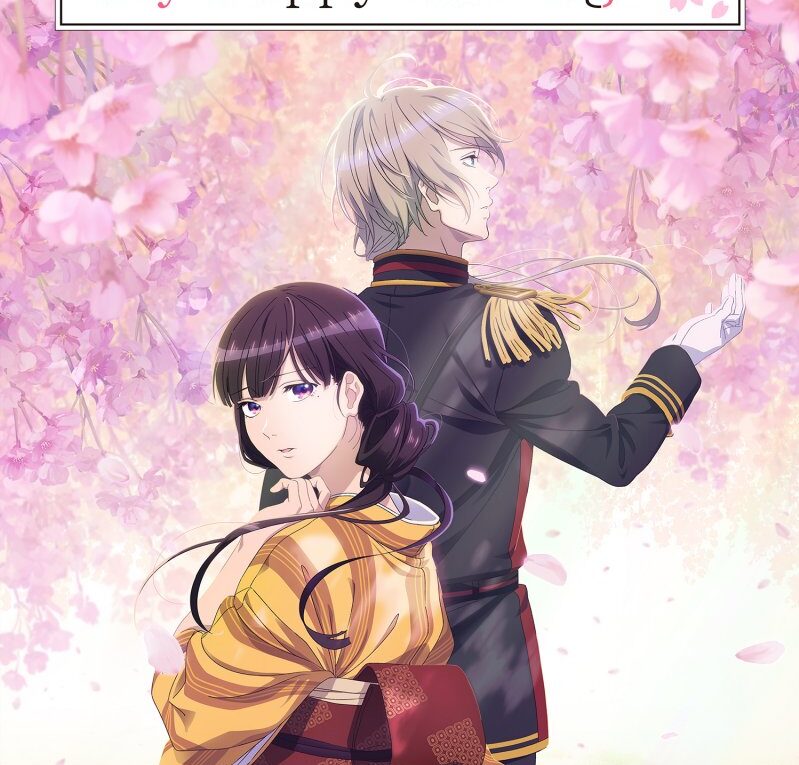English Dub Season Review: My Happy Marriage Season Two
They say that “happily ever after” marks the end of someone’s fairy tale after enduring many obstacles to achieve that dream. However, there are some occasions when a fairy tale ending marks the beginning of a new chapter of their lives. In the case of Miyo (Miranda Parkin) and Kiyoka (Damien Haas), regaining their happiness was only the first step in achieving that fairy tale ending. My Happy Marriage was one of the anime I didn’t expect to get immediately attached to until I watched it myself, especially since I’m very picky with the romance genre. Some of the genre’s shows were tolerable in their concepts, while others manifested enough lovey-dovey corniness to make detractors puke their guts out.
My Happy Marriage is in the category that utilizes tropes to effectively convey its themes, animation, and the characters’ believable relationship. Because of this, it exceeded my expectations by becoming one of my favorite shows of the genre due to the leads’ chemistry and compelling story. With the success of its first season in 2023, it was only a matter of time before we reunited with one of anime’s adoring couples via its second season. Considering my experience with season one and the recently released OVA episode, there’s no doubt that I was the right person to review the continuing adventures of Miyo and Kiyoka. But is this season’s plot worthy of progressing this happy marriage? Unsurprisingly, yes.
Much like season one, the second season utilized the show’s vibrant presentation and likable characters to convey an engaging and tranquil reflection of love over despair while progressing its developing journey for its couple. Would I say it’s better than season one? Well, that’s a tough wall to climb since the first season was packed with emotional moments involving character development that were genuinely impactful. One of which was Miyo’s coming-of-age journey involving her facing the trauma received from the Saimori family’s abuse despite her lack of supernatural talent. The other is Kiyoka, a seemingly stern and cold general who never experienced the meaning of love until he met Miyo, resulting in his extremely satisfying confrontation with the Saimori family in “Determination and Thunder”. While it played out like a supernatural fantasy Cinderella story, the series’ development provided me with a sense of fulfillment that engaged me in the characters’ journeys.
However, that’s not to say season two had no magical moments to match the previous one’s quality. The season continues to explore Miyo’s coming-of-age journey, as she’s now promoted to Kiyoka’s fiancee. However, despite overcoming the trauma of living with the Saimori family and gaining her Dream Sight ability, Miyo still possesses a timid and sensitive side that prevents her from being internally healed. While Kiyoka’s arc in season one concludes with him expressing love towards Miyo, the protagonist lacks the courage to showcase her love to him. It also didn’t help that she started to learn more about her family’s history due to the arrival of Naoshi Usui (Kaiji Tang), the leader of the mysterious Gifted Communion with ties towards her mother, Sumi (Miranda Parkin). Most viewers may call Miyo’s growth in season two similar to season one, indicating that she didn’t change that much, but it’s also important to remember that it takes time to heal from the trauma, big or small. Season two clearly shows that to an extent while ensuring that her journey felt earned in its sentimentality, especially in the season finale.
One example is the season’s first three episodes, which followed Miyo and Kiyoka investigating the Grotesqueries’ appearances around Kiyoka’s village. While Kiyoka’s investigation had its share of engagement, the real heart of those episodes was Miyo’s determination to prove her worth as a fiancee to Kiyoka’s mother, Fuyu (Monique Shi), whose extremely strict and abrasive persona left her estranged from her son. Undoubtedly, Fuyu is just as ignorant and heartless as Kanoko Saimori regarding mother figures. However, what stood Fuyu apart from Miyo’s abusive stepmother was her gradual respect for Miyo’s determination as the season progressed, yet she maintained her stern appearance. As a result, Fuyu’s rudeness was more tolerable, and its predictable narrative elements were rewarding.
The season’s second half played off the same way as the first three episodes, in which the characters stayed at the imperial palace for protection from Usui. Fortunately, it’s necessary for character growth rather than repeating what Miyo experienced at Kiyoka’s home. The main reason is, as mentioned before, Miyo’s struggle to overcome her timidness and fear to be more independent and express her love for Kyoka. More importantly, she strives to master her Dream Sight ability to confront Usui, who seeks to use her powers for nefarious purposes. This led to a finale that was long overdue because of the unexpected one-month delay but satisfying in the arc’s outcome and the emotional baggage it carried with its animation style.
The second season of My Happy Marriage benefited strongly from the elements that elevated its previous season, with one being the voice cast. Miranda Parkin further excels in conveying Miyo’s kind-hearted yet soft-spoken aura with enough grace and beauty to highlight her engaging character arc. Damien Haas also continued to provide solid work as Kiyoka regarding his changing personality from an intimidating soldier to a warm-hearted soon-to-be husband. I would also credit Kaiji Tang, whose vocal performance effectively emphasizes Naoshi Usui’s layered persona. Usui possesses a formidable side to his villainous aura, but his history with Sumi resembles him more as someone who’s tragically at a point of no return. The animation by Kinema Citrus also retained a sense of beauty and vibrancy in its presentation, action, and visuals. While the violence has its moments regarding the presentation and direction, the animation truly shines the most when it focuses heavily on the drama and supernatural abilities, mainly Miyo’s Dream Sight. This resulted in a series of gorgeously rendered production designs you’d typically find in an art museum.
It felt like yesterday when I was first introduced to My Happy Marriage. I was initially concerned about the concept and the characters’ abuse towards Miyo, only to find beauty within its themes of trauma and happiness. Fast forward to today, and I still couldn’t get enough of these two people longing for a peaceful life, which they finally got in the finale. This defines my experience with this show as a whole, which surprised me with its genuine mixture of heart, sentimental drama, and supernatural fantasy. Thanks to its visually stunning style and engaging characters, the series is a highly engaging and genuinely heartfelt experience worthy of residing with other romance anime.












"There are also other characters that come and go (also owned by the Warner Bros. Discovery conglomerate media company)."
Huh. Is that just referring to other characters from the show itself, or is this implying that the new season is going to have cameos from other WBD IPs